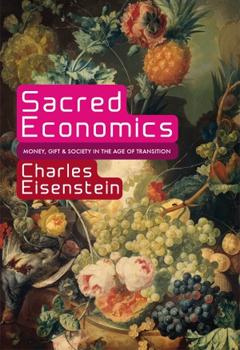 Sacred Economics: Money, Gift and Society in the Age of Transition
Sacred Economics: Money, Gift and Society in the Age of Transition
by Charles Eisenstein
(Evolver Editions, 496 pp., paperback: $22.95, Online: Free, July 2011)
Before you read a word of Charles Eisenstein’s new book, you can see that the author puts his money where his mouth is. Sacred Economics: Money, Gift and Society in the Age of Transition is published under a Creative Commons copyright, and is entirely available in serial form on realitysandwich.com. It is a gift to the public, unbound by most legal reservations.
This arrangement, similar to that of open-source software, is a tiny sample of the economic system that Eisenstein predicts for our future. This economic system rejects the practice of turning natural resources (in this case, ideas) into commodities. Instead, it freely circulates those resources into society and has faith that their full value—social, cultural, spiritual and financial—will be realized and fairly distributed through the power of public gratitude.
Of course, a new economy means the old one needs to go. That would be scary news if not for Eisenstein’s optimistic way of describing the transition. He effectively argues that when we dismantle monetization, we give birth to community. Together, we can help noble impulses become profitable enterprises. Money may have caused our biggest problems, but redefining it could help us solve those same problems.
As you might expect from a professor (Health Arts and Sciences, Goddard College), Eisenstein advances his discussion by asking lofty questions. However, he manages to express his answers, for the most part, in straightforward language. Most importantly, when he gives advice for cultivating the new economy, it’s aimed at the individual, and it seems realistic. And, it’s also worth much more than I paid for the book.
—Brian Case




This is a great book with a whole new view of economic, but I am not sure how feasible and realistic these approaches are. Through out the history man has proved to be greedy and will do what it can to achieve his selfish and greedy goals. Bad Credit Loans
This is a great book with a whole new view of economic, but I am not sure how feasible and realistic these approaches are. Through out the history man has proved to be greedy and will do what it can to achieve his selfish and greedy goals. Bad Credit Loans